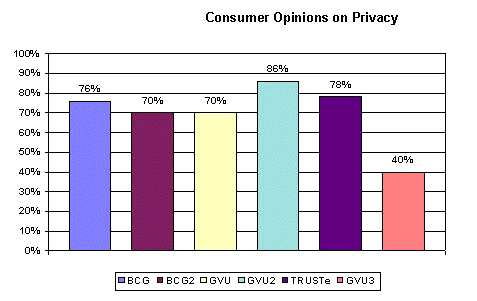|
Widespread Concerns About Privacy
In the marketplace, companies have routinely had access to better information and better resources which has generally been leveraged against the individual. However, until the last 50 years, the economy was based on manufacturing and so information was an influential factor, but not a product, in and of itself. Consequently, information gathering was a peripheral activity.
Times have changed. The explosion of the Internet demonstrates the power and value of information (which has garnered center stage) and has led to frequent abuses of privacy including corporate espionage, reconnaissance, and counterintelligence missions of consumers, competitors, and suppliers. As the value of information continues to increase, these abuses will remain unabated and consumers will be increasingly hostile to information requests. In fact, surveys have shown that privacy is already a highly sensitive issue on the Internet and a potential impediment for e-commerce.

| BCG - A BCG Consumer Survey of users who expressed concern over Web sites monitoring their browsing habits | GVU2 - The same survey of consumers who expressed a desire to control use of their demographic information. |
| BCG2 - The same survey of users who expressed concern about making purchases online. | TRUSTe - TRUSTe's survey of individuals who said they would be more likely to provide information to Web sites that provided privacy guarantees. |
| GVU - An annual Web survey conducted by the Graphics, Visualization and Usability Center of the Georgia Institute of Technology shows consumers who cited privacy concerns as their primary reason for not registering demographic information with Web sites on the Internet. | GVU3 - Another Georgia Tech study of users who reported providing false information at least once while registering at a web site. |
These surveys suggest that individuals have strong concerns about a company's use of personal data. This fear is well grounded. Businesses are in business to produce profit and it is difficult to resist the temptation to use personal data that could create additional revenue. The following list (in part provided by John Hagel and Marc Singer in their book, Net Worth) catalogs a few samples of privacy breaches.
- The web site GeoCities suffered a 15 percent drop in the market value of its stock after settling charges with the Federal Trade Commission that it had been secretly selling personal information to marketers. GeoCities maintains that nothing illegal was done. Immoral or unethical, perhaps, but definitely not illegal.
- Pacific Bell, either ignorant or blatantly apathetic, wanted to send unsolicited sales pitches to customers with unlisted phone numbers. PacBell seems to be saying you can run, but you can't hide.
- Internet behemoth America Online sold its members' phone numbers (without consent) to a telemarketing company. In an unrelated event, AOL turned over personal data about an individual's sexual preferences to the U.S. Navy without the individual's consent. AOL's motto: don't ask, but we'll tell.
- Financial services giant American Express announced plans to sell extensive information on its cardholders to merchants. This data is like a pile of cash sitting in the corner. Other companies are reaping the rewards, so why can't AmEx do it, too?
- Smaller companies can get into the act, too. Blizzard Entertainment admitted it had acquired data (again without consent) from its customers' PCs via the Internet. How's that for interactive entertainment?
- Giant Foods (a supermarket chain) and CVS (a drugstore chain) shared medical information with a drug marketer who sent out friendly prescription reminders and helpful literature about new drugs. Now the friendly and helpful mailman knows your medical history.
- GTE accidentally published 50,000 unlisted phone numbers and addresses. However, GTE expressed its deepest apology over the incident so it shouldn't be held legally or morally responsible for the consequences to the personal safety of police officers and crime victims who had this information unexpectedly divulged.
- Microsoft acknowledged that their Office software products utilized a serial number that could be used to trace every document an individual creates. TRUSTe, the industry watchdog that is partly financed by Microsoft, firmly admonished Microsoft and politely asked the company to refrain from similar behavior in the future.
- In an attempt to support e-commerce, Intel announced a plan to place serial numbers in its Pentium chips. An enormous privacy backlash convinced Intel to provide software that could turn this wonderful feature off. However, a hacker demonstrated that this feature could be remotely turned on without the user's knowledge. Perhaps the software simply experienced a floating point error.
- In response to the Intel debacle, Sun Microsystems CEO Scott McNealy said, "You have no privacy. Get over it." Perhaps, two hundred years ago, Benedict Arnold had similar comments about British oppression.
Privacy, as defined by Brandeis, is not the solution. Individuals want to share their personal data in order to benefit from personalized services, screen out unwanted advertisements and to find out about new products (especially from competitors) for which they have an interest. However, individuals also want control over their personal data. Moreover, they want to be compensated by marketers for their increasingly valuable time.
